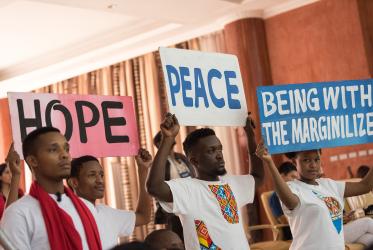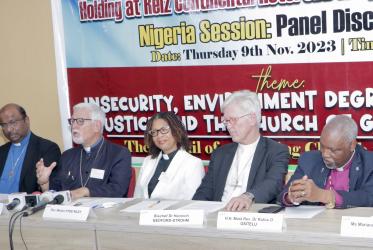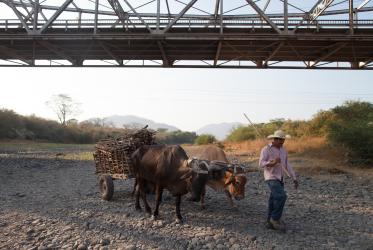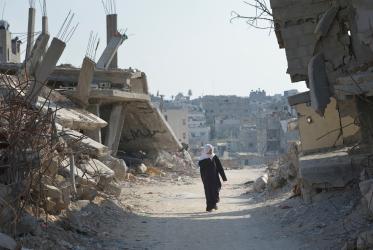The report of the Officers to the Central Committee is a constitutional obligation. The purpose of this report is to inform the Central Committee of the decisions taken by the Executive Committee at its meetings of 17-20 February and 24-27 August 2004, as well as those taken by the Officers at their meetings of 20-21 November 2003, 9-10 June and 28-29 November 2004.
Programme
- A multi-religious international conference be held in 2004, provided that financial and human resources are available.
- An appropriate follow-up be done on the issue of anti-semitism, particularly in Europe.
- A first list of delegates to the CWME 2005 Conference be approved in June 2004 by the Officers, and a more complete list be prepared for approval at the August 2004 Executive Committee.
- The WCC take a leadership role in promoting a coordinated approach among churches and ecumenical partners with regard to the relations with the World Bank and the IMF.
In relation to the CWME Conference, the Officers recommended in June 2004 to contact the churches that had not responded and to invite Orthodox staff to remind heads of Orthodox Churches to respond and, taking into account the overall distribution of seats, to include more Orthodox in the category of advisers.
Also at their June 2004 meeting, the Officers received reports of a house-wide staff group and the IRRD Reference Group and agreed to the proposal that the inter-faith conference be postponed to June 2005 in order to allow for careful preparation. The Officers also noted that the time had come to increase staff capacity in the IRRD team.
In February 2004, the Executive Committee approved the Terms of Reference for the Pre-Assembly Programme Evaluation and nominated an Evaluation Team (Dr Marion Best, Ms Sylvia Raulo, Fr George Tsetsis, Dr William Ogara) to carry out the evaluation process during the year 2004 and to present an interim report at the next meeting of the Central Committee in February 2005.
The Officers, at their meeting in November 2004, discussed the status of the Harare to Porto Alegre report and decided to bring the question to the Executive Committee for decision. The report could be understood as a report of the Central Committee to the Assembly or as a book describing the major work done and witness given by the WCC.
Assembly
At their meeting in November 2003, the Officers confirmed the formulation of the Assembly theme in English (God, in your grace, transform the world), as well as the translations into German (In deiner Gnade, Gott, verwandle die Welt) and into French (Transforme le monde, Dieu, dans ta grâce). Further, the Officers finalized the composition of the Assembly Worship Committee and were informed that both the Assembly Planning Committee and the Assembly Worship Committee would meet in Bose, Italy, in February 2004, prior to the Executive Committee meeting.
At its February 2004 meeting, the Executive Committee affirmed the main directions suggested by the Assembly Planning Committee with regard to the programme of the Assembly and encouraged the Worship Committee to continue its work along the lines spelled out in the report of their first meeting which took into consideration all sensitivities implied in this area and affirmed the importance of prayer life for the whole Assembly.
The Executive Committee decided to raise the total number of delegates to 728, in order to lower the scale for churches with 3 delegates to 2.500.000 and thereby increase the number of churches with 3 delegates, considering that an increase of 4% is within the Central Committee requirement of not exceeding significantly the ceiling of 700. In taking this decision, the Executive Committee satisfied itself that the 4% increase shall not affect the budgeted amount for subsidies which will remain the same.
The number of seats to be allocated to each member church, the policy to be implemented in allocating financial subsidies to Assembly participants and the registration fee for participants in the Assembly were decided on by the Executive Committee. These decisions were communicated to the member churches, informing them of the number of seats allocated and inviting them to appoint their delegates to the Ninth Assembly.
In June 2004, the Officers considered and authorized the official logo of the Assembly.
At its meeting in August 2004, the Executive Committee created a new category called "Advisors to Delegations", specifically meant for Ecumenical Officers and persons responsible for relations in the member churches. The number is limited to one advisor per delegation, and all expenses are to be covered by the respective church.
Public Issues
In February 2004, the Executive Committee adopted two statements: on the erection of the wall in the occupied Palestinian territories and on nuclear non-proliferation; and two minutes: on peace in Sudan and India-Pakistan.
In the statement on Nuclear Non-Proliferation the Executive Committee reaffirmed its conviction that the only ultimate protection against nuclear weapons is their total elimination. At the core of this problem is the built-in dilemma that the WCC has pointed at for decades: That as long as the most armed countries in the world insist on having nuclear weapons for their own security, other states will insist on the right to do the same. Secondly, there would always be the risk that non-state actors will try to access nuclear weapons. The statement will guide the WCC work on nuclear disarmament and non-proliferation, in particular in preparation for the Review of the Non-Proliferation Treaty in 2005.
Statements on Korea and Sudan were adopted by the Executive Committee at its meeting in August 2004, as well as Minutes on Somalia and Zimbabwe.
Financial Matters
In November 2003, the Officers received reports about the financial situation of the WCC. Results as of September 2003 were positive and the expected year-end results were within or even below the approved budget. The Officers also reviewed and approved the budget for 2004 and considered preliminary programmatic and financial plans for 2005.
In February 2004, the Executive Committee recommended that the 2005 Framework Budget approved by the Central Committee in August 2003 be amended to include certain revised financial information, e.g. a) revision of maintenance expenditure for fixed assets, b) revision of programme fund balances brought forward and c) that the goal of CHF 1 million to be added to the reserves be preserved. The Officers of the Executive Committee were authorized to approve the revised budget at their meeting in June 2004.
In the light of uncertainties about exchange rates, difficult financial situations facing some of the Council's funding partners and the downward trend in income, the Officers, at their meeting in June 2004, requested that an update of the 2005 budget, within the parameters set by the Finance Committee, be presented to the Seoul Executive Committee. The Officers further called for an intensification of fund-raising efforts which should be undertaken with due sensitivity. They also shared the concern in many churches about GDP-based membership calculation, asked for a careful dealing with this matter, proposed that a staff group work on it after the Officers' meeting, and urged that an analysis and interpretation of GDP-based membership contributions be brought to the Executive Committee.
In August 2004, the Executive Committee reaffirmed the membership calculation system as already articulated and the special task force's contribution to its implementation. The Committee required that further reminder letters be sent to the churches that have not responded and those who have contributed amounts less than requested without any explanation.
The Executive Committee also ratified the Financial Report 2003 as audited and published for submission for approval to the Central Committee in February 2005. The Committee received the budget 2005 which had been approved by the Officers in June 2004 and endorsed the approved increase in the General Reserves to CHF 5.2 million, this being CHF 0.6 million above the balance required by Central Committee policy. In this spirit, the preliminary 2006 framework budget was approved as presented. The Committee required that the 2006 budget include all expected costs and that it be balanced with a token surplus.
Membership
At its meeting in February 2004, the Executive Committee considered applications for membership from five churches. The following four were approved for reception into WCC membership: Evangelical Baptist Church of Angola, The African Church (Nigeria), Methodist Church in Indonesia, and Baptist Convention of Haïti. With regard to the fifth application, the Executive Committee asked for further work to be carried out to enable a decision to be made at a later meeting.
In August 2004, the Executive Committee recommended that: (a) the Protestant Evangelical Church of Guinea be received as a member church belonging to the fellowship of the WCC; (b) the Association of Evangelical Reformed Churches in Burkina Faso be received as an associate member church belonging to the fellowship of the WCC; and (c) the Protestant Church in the Netherlands be accepted as a member church in the fellowship of the WCC in continuation of the membership of the former Netherlands Reformed Church, Reformed Churches in the Netherlands and Evangelical Lutheran Church in the Kingdom of the Netherlands.
In relation to the Kimbanguist Church and the question of the theological deviations in the church, the Executive Committee decided that, while the WCC is willing to continue the dialogue in the context of the work of the Theological Commission set up by the Kimbanguist Church, it cannot afford to postpone indefinitely the question of the membership of the Kimbanguist Church. The meeting of the Executive Committee in September 2005 was fixed therefore as the final date for a decision.
Consensus Method
At its meeting in February 2004, the Executive Committee considered carefully the Draft Rule XVI: Conduct of Meetings and the Working Draft of the Manual for Meeting Procedures, received them and authorized that they be shared with member churches and members of the Central Committee for their information and eventual comment. In the light of comments received, the two documents would be revised to enable the Executive Committee at its meeting in August 2004 to finalize the new framework. In June 2004, the Officers suggested to simplify the documents as far as possible, giving clear and concise definitions.
The Officers also requested that, since the Central Committee will have to implement the consensus mode, an explanation be given at the beginning of each session to show the distinctions between, and expectations from the different sessions. The decision to adopt the consensus mode will come at the end of the Central Committee, allowing members to take such a decision after having had a concrete experience of the procedures.
In August 2004, the Executive Committee received a progress report and authorized the inclusion in the Draft Rule XVI of the suggestions made by member churches and the Steering Committee of the Special Commission on Orthodox Participation in the WCC in consultation with participants in the consultation that had elaborated the first draft of the new Rule XVI (Bossey, February 2004). After consideration of sections I to XV of the actual Constitution and Rules in light of the changes to the Rules of Debate, the new Rule XVI will be submitted to the Central Committee in February 2005 for adoption.
Taking into consideration the need for training with the new way of proceedings, the Executive Committee recommended that the Central Committee and Assembly time-tables include occasions for the appropriate preparation of delegates.
Change in the Rules
In August 2004, the Executive Committee authorized preliminary work for creating an appropriate category in the Rules that expresses the relationship and cooperation between the WCC and the Specialised Ministries, and reflects the relationships of these bodies with the member churches.
Central Committee Agenda
At their meeting in June 2004, the Officers agreed that the overarching theme for the 2005 Central Committee would be "Healing and Reconciliation". The proposed plenaries on Human Sexuality and on the Pacific were accepted.
Staffing
At their meeting in November 2003, the Officers appointed Ms Natalie Kim Maxson, United Church of Canada, as Programme Executive for Youth. They were informed about the appointment of Ms Lina Moukheiber as Programme Executive for the Middle East (consultancy appointment by the General Secretary). They authorized vacancies for the Programme Secretaries for Europe and for Peace-Building and Disarmament. The Officers were also informed about the vacancy for an Executive Secretary of the Jerusalem Ecumenical Centre, to be jointly appointed by the Jerusalem churches, the MECC and the WCC.
At the February 2004 meeting of the Executive Committee, the following three-year contract extensions were approved: Mr Michiel Hardon (Programme Executive for Income Monitoring and Development), Rev. Carlos Ham (Programme Executive for Mission and Ecumenical Formation), Ms Tara Tautari (Programme Executive for Scholarships), Rev. Dr Martin Robra (Programme Executive for Justice, Peace and Creation), and Dr Guillermo Kerber Mas (Programme Executive for International Affairs, Peace and Human Security). The Executive Committee declared two vacancies: Director, Commission on Faith and Order, and Programme Executive, Focus on Middle East and Disarmament in the International Affairs team. At their meeting in June 2004, the Officers agreed to the appointment of Jonathan Frerichs to the latter position.
At its August 2004 meeting, the Executive Committee approved the contract extensions for three years of Rev. Dr Hans Ucko (Programme Executive, IRRD), Mr Hansulrich Gerber (Programme Executive, DOV), Rev. Dr Thomas Best (Programme Executive, Faith and Order [currently Dr Best is Acting Team Coordinator and Director of Faith and Order]), Dr Elizabeth Ferris (Programme Executive and Team Coordinator, Diakonia & Solidarity), Rev. Dr André Karamaga (Programme Executive, Africa Desk, Diakonia & Solidarity), and Ms Marta Palma (Programme Executive, Latin America Desk, Diakonia & Solidarity). The contract of Rev. Kersten Storch (Programme Executive, Faith and Order [EKD secondment]) was extended for two years.
Nominations
In November 2003, the Officers approved the nomination of Dr Bernice Powell Jackson to succeed the Rev. Kathryn Bannister as WCC President for the North America region, to be recommended to the Executive Committee and, after a positive response by the Executive Committee, to be submitted to the Central Committee for confirmation by postal vote. At their meeting in June 2004, the Officers endorsed the election by postal vote.
In February 2004, the Executive Committee filled a number of positions which had fallen vacant in the governing bodies, commissions and the Assembly Worship Committee. It approved the following: Priest Andrei Eliseev (Russian Orthodox Church) to be a member of the Central Committee; Ms Gwen Cashmore (Anglican, UK), Rev. Susan Henry-Cowe (United Methodist Church, USA) and Ms Phebe Gamata Crismo (United Methodist Church, Philippines) for the Assembly Worship Committee; Rev. Wesley Granberg-Michaelson (Reformed, USA) to the Continuation Committee of the Global Forum as WCC representative; Dr Karen Nazaryan (Armenian Apostolic Church) on the JPC Commission.
In August 2004, the Executive Committee approved the nominations for Central Committee of Rev. Lydia Veliko, United Church of Christ, to replace Dr Bernice Powell Jackson; Rev. Oscar Bolioli, Evangelical Methodist Church in Uruguay, to replace Ms Laura Saavedra; and Dr Anna May Say Pa, Myanmar Baptist Convention, to replace Ms Rosebelle Thu Lay Paw who died in March 2004.
Ecumenical News International (ENI)
At its meeting in August 2004, the Executive Committee requested WCC staff to participate actively in the process of the ENI Roundtable on the future of ecumenical news as an opportunity to generate new ideas for a necessary review of the strategies and vision of ENI, and recommended that WCC's future level of involvement with ENI be assessed at the Executive Committee meeting in September 2005 in the light of ENI's mandate and the renewed strategy and revised business plan.
Reconfiguration
In follow-up to the Antelias consultation, the Officers, at their meeting in June 2004, welcomed proposals to hire a consultant for the mapping of the present structures of the ecumenical movement; to invite a wide range of participants in the ecumenical movement to articulate and share their visions about the ecumenical movement in the 21st century; and to hold a consultation bringing together partner organizations (REOs, NCCs, CWCs, Specialized Ministries, etc.) and member churches. They observed that the process had become more complex, thus not only the structures but also the content had to be taken seriously into consideration, and recommended that representatives of member churches should make up no less than half of the participants in this consultation.





